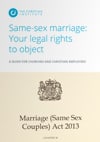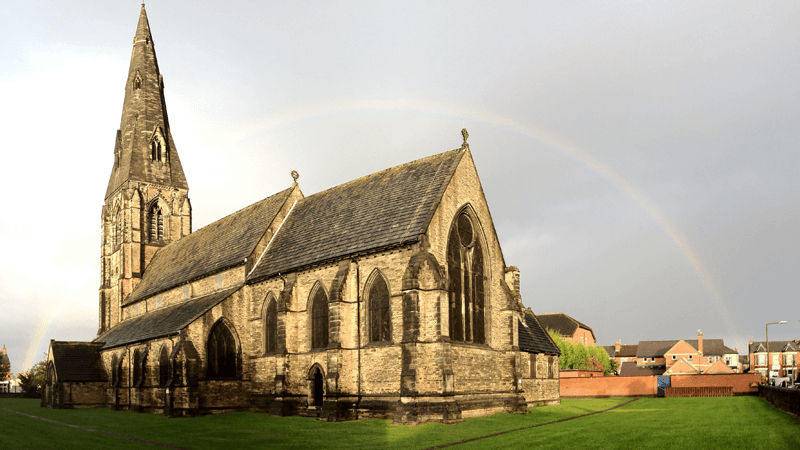
Same-sex marriage: Your legal rights to object
A guide for churches and Christian employees
Same-sex marriage is now legal in England and Wales. Under the Marriage (Same Sex Couples) Act, the first same-sex marriages took place on 29 March 2014.

When marriage was redefined in law in 2013 in England and Wales, the Westminster Government made assurances that churches would not be strong-armed into allowing same-sex weddings to take place in their buildings.
A fourfold group of safeguards – nicknamed the ‘quadruple lock’ – was written into law to ensure that Christian denominations and independent churches would have the right to conscientiously object to an interpretation of marriage which is profoundly contrary to Scripture.
As it stands, the quad lock:
• makes clear that a religious marriage ceremony of a same-sex couple will only be possible if:
i. the governing body of the religious organisation has opted in by giving explicit consent to marriages of same-sex couples; and
ii. the individual minister is willing to conduct the marriage, and
iii. if the ceremony takes place in a place of worship, those premises have been registered for marriages of same-sex couples.
• explicitly states that no religious organisation can be compelled by any means to opt in to marry same-sex couples or to permit this to happen on their premises; and no religious organisation or representative can be compelled by any means to conduct religious ceremonies for same-sex couples.
• amends the Equality Act 2010 to make clear that it is not unlawful discrimination for a religious organisation or representative to refuse to marry a same-sex couple.
• ensures that the common law legal duty on the clergy of the Church of England and the Church in Wales to marry parishioners does not extend to same sex-couples.
It also protects the Church of England’s canon law, which says that marriage is the union of one man with one woman, so that it does not conflict with civil law.
Maria Miller, the minister originally responsible for the Marriage (Same Sex Couples) Act 2013, said at the time that protections afforded to churches by the legislation were “iron clad”. She said no religious organisation would be compelled to support same-sex marriage.
Ten years on, an attempt is being made to trash these protections. Ben Bradshaw MP, who describes himself as a lifelong Anglican, said in 2013 it was the “prerogative” of the CofE not to conduct same-sex weddings. In a complete about-turn, he now wants to force the Church of England to change its rules so that clergy can “conduct same sex marriages on Church of England premises in certain circumstances”.
Although the CofE recently voted to “welcome” plans for churches to bless same-sex partnerships, churches do not have the authority to conduct same-sex weddings.
Bradshaw and others have tabled a Ten Minute Rule Bill to try and accelerate the process. They recognise there is no chance the Bill will become law as this kind of legislation rarely does, but they want it to “draw attention to an issue” and hope it will be “a precursor to actual legislation”.
This is an attempt to promote LGBT theology in churches by those who feel the Church must change to promote and celebrate the cultural norms of today. Sadly, this group also believe that most Christians agree with them, and that those who don’t should be kicked to the kerb.
Bradshaw said just a few months ago: “Is it not increasingly clear that a small minority in the Church of England will never be reconciled with treating lesbian and gay people equally, and it would be better to let those people go, so that the Church can focus on the majority of Anglicans in this country who support treating lesbian and gay people equally?”
The Church of England Evangelical Council has regularly stated its position that the Church of England should not change its doctrine, but instead remain faithful to the Bible and CofE canon law. As such, it would be categorised as being part of the ‘small minority’ by Bradshaw.
However, one of its many member organisations is Christianity Explored, which runs courses for half a million people worldwide every year. Holding to the historic, biblical definition of marriage, therefore, is hardly a minority view.
Bradshaw’s statement is also a complete misrepresentation of Evangelical views. While Evangelicals believe in the authority of Scripture, and believe marriage is the union of one man and one woman to the exclusion of all others for life, they believe lesbian and gay people should be treated equally.
They believe LGBT people should be welcomed into the church so that they, like everyone else, should be able to hear the Gospel preached and come to a saving faith in Christ Jesus. But they do not believe that same-sex sexual behaviour, condemned in the Bible, should be promoted or condoned any more than sinful heterosexual behaviour like adultery or extra-marital sex.
Ultimately, attempts like this to change the law flagrantly interfere with Church doctrine and must be decisively rejected. Though this is framed as ‘enabling’, it would actually mean the Church of England being coerced into allowing same-sex marriages, contrary to its doctrine.
If successful, this brazen attack on religious liberty undermines, and could ultimately wreck, the whole package of protections for churches.

Same-sex marriage is now legal in England and Wales. Under the Marriage (Same Sex Couples) Act, the first same-sex marriages took place on 29 March 2014.